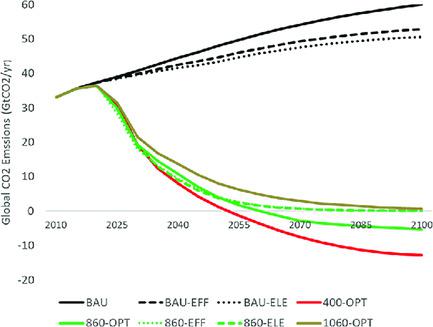当前位置:
X-MOL 学术
›
Energy Technol.
›
论文详情
Our official English website, www.x-mol.net, welcomes your feedback! (Note: you will need to create a separate account there.)
Global Energy System Transformations to 1.5 °C: The Impact of Revised Intergovernmental Panel on Climate Change Carbon Budgets
Energy Technology ( IF 3.8 ) Pub Date : 2020-07-16 , DOI: 10.1002/ente.202000395 Panagiotis Fragkos 1
Energy Technology ( IF 3.8 ) Pub Date : 2020-07-16 , DOI: 10.1002/ente.202000395 Panagiotis Fragkos 1
Affiliation

|
The Paris Agreement calls for countries to pursue efforts to limit temperature increase to 1.5 °C. Scenarios that limit global warming to 1.5 °C describe fundamental transformations in energy systems and typically rely on emission reductions combined with carbon dioxide removal (CDR) from the atmosphere, mostly through large‐scale application of bioenergy with carbon capture and storage (BECCS). These options face several difficulties, such as reliance on underground CO2 storage and competition for land with food production. Here, using the PROMETHEUS global energy system model, alternative deep mitigation pathways are explored, in light of the revised carbon budgets specified in the Intergovernmental Panel on Climate Change (IPCC) Special Report on 1.5 °C. The pathways assess the potential contribution of energy efficiency improvements and more rapid electrification of energy services based on renewable energy. Although these alternatives also face specific implementation challenges, they are found to significantly reduce the need for CDR and BECCS, but not fully eliminate it, and offer an effective way to diversify transition pathways to meet the Paris targets. Achieving the 1.5 °C target is technically feasible but requires immediate, ambitious, and global action, based on large‐scale deployment of renewables, early retirement of fossil‐based power plants, accelerated efficiency improvements, and expansion of carbon‐free options in end‐uses.
中文翻译:

全球能源系统向1.5°C的转变:政府间专家小组修订对气候变化碳预算的影响
《巴黎协定》呼吁各国努力将温度上升限制在1.5°C以内。将全球变暖限制在1.5°C的情景描述了能源系统的根本转变,并且通常依赖于减排与从大气中去除二氧化碳(CDR)相结合,主要是通过大规模应用生物能源以及碳捕集与封存(BECCS)。这些选择面临一些困难,例如依赖于地下CO 2粮食储藏和土地竞争。在这里,根据政府间气候变化专门委员会(IPCC)关于1.5°C的特别报告中指定的经修订的碳预算,使用PROMETHEUS全球能源系统模型,探索了替代性的深度缓解途径。这些途径评估了提高能效和使基于可再生能源的能源服务更快速电气化的潜在贡献。尽管这些替代方案还面临特定的实施挑战,但发现它们可以大大减少对CDR和BECCS的需求,但并不能完全消除它们,并提供了一种有效的途径来实现过渡路径多样化,以实现巴黎目标。实现1.5°C的目标在技术上是可行的,但需要在大规模部署可再生能源的基础上立即采取雄心勃勃的全球行动,
更新日期:2020-09-05
中文翻译:

全球能源系统向1.5°C的转变:政府间专家小组修订对气候变化碳预算的影响
《巴黎协定》呼吁各国努力将温度上升限制在1.5°C以内。将全球变暖限制在1.5°C的情景描述了能源系统的根本转变,并且通常依赖于减排与从大气中去除二氧化碳(CDR)相结合,主要是通过大规模应用生物能源以及碳捕集与封存(BECCS)。这些选择面临一些困难,例如依赖于地下CO 2粮食储藏和土地竞争。在这里,根据政府间气候变化专门委员会(IPCC)关于1.5°C的特别报告中指定的经修订的碳预算,使用PROMETHEUS全球能源系统模型,探索了替代性的深度缓解途径。这些途径评估了提高能效和使基于可再生能源的能源服务更快速电气化的潜在贡献。尽管这些替代方案还面临特定的实施挑战,但发现它们可以大大减少对CDR和BECCS的需求,但并不能完全消除它们,并提供了一种有效的途径来实现过渡路径多样化,以实现巴黎目标。实现1.5°C的目标在技术上是可行的,但需要在大规模部署可再生能源的基础上立即采取雄心勃勃的全球行动,



























 京公网安备 11010802027423号
京公网安备 11010802027423号